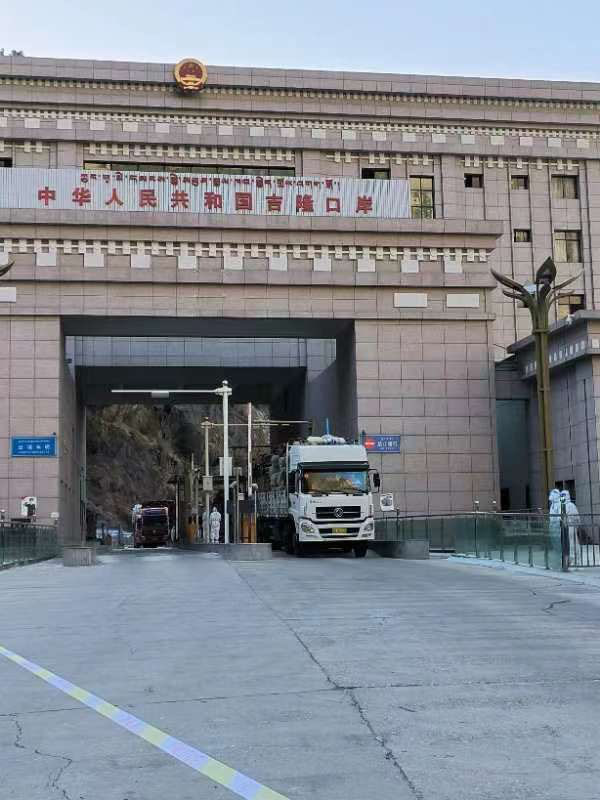Two-way trade via Kerung/Rasuwagadhi border point resumes
The two-way trade between Nepal and China has resumed through the Kerung/Rasuwagadhi border point from Wednesday.
Six cargo trucks loaded with Nepali goods passed through the border point into China amidst a ceremony today.
The trade between the two countries has been shut since the start of the Covid-19 pandemic in 2020.
Nepali businessmen and traders, who were hit hard by the pandemic, had been demanding resumption of the border point.


Business community seeks support from the new government
Hard hit by the persistently high interest rates, a prolonged liquidity crunch, and a sharp slowdown in business activities, the country's private sector bodies have swung into action to get their voice heard by the new dispensation in the Singhadurbar. On the top of their agenda is the postponement of the guidelines on working capital loans introduced by Nepal Rastra Bank. The two leading private sector organizations - The Federation of Nepalese Chambers of Commerce and Industry (FNCCI) and the Confederation of Nepalese Industry (CNI)- separately met Prime Minister Pushpa Kamal Dahal at his residence on Tuesday morning. The FNCCI and CNI delegations also met Finance Minister Bishnu Poudel later in the afternoon. The FNCCI delegation led by its President Shekhar Golchha apprised the PM about the difficulties faced by the private sector as well as the current state of the country's economy. During the meeting, Golchha raised the issue of postponement of the guideline on working capital loans and stressed the need for interest rate stability. The private sector has been lobbying hard for the postponement of the working capital loans guidelines by at least two years. PM Dahal assured FNCCI delegates saying that he is also studying the past suggestions of FNCCI and that initiatives will be taken to resolve the problems soon with the cooperation between the Finance Ministry, Nepal Rastra Bank, and the private sector. The CNI team led by its President Vishnu Agrawal presented a concept note on 'Rebooting Nepalese Economy' along with the clear steps to be initiated immediately in order to revive the country's economy. CNI has also suggested measures that can be taken immediately by prioritizing the financial sector (liquidity crisis and high-interest rates), industrial promotion, infrastructure, tourism, energy, and information technology sectors to give momentum to the Nepali economy. "We have prioritized the economic recovery from the very first meeting of the Council of Ministers. We will be moving ahead in collaboration with the private sector," remarked PM Dahal meeting with the CNI team. CNI office bearers also met finance minister Paudel and suggested that the government take steps to bring down bank interest rates by 2 percent and defer the guidelines on working capital by two years to raise the confidence of the private sector. CNI President Agrawal urged the finance minister to implement the six unimplemented industrial zones on the model of India's Rudrapur Industrial Zone as soon as possible through the public-private partnership to encourage import-substituting industries.
Nepse surges by 59. 87 points on Tuesday
The Nepal Stock Exchange (NEPSE) gained 59.87 points to close at 1, 983. 95 points on Tuesday. Similarly, the sensitive index surged by 10.59 points to close at 386. 04 points. A total of 12,029,603 unit shares of 261 companies were traded for Rs 3. 88 billion. Meanwhile, Siddhartha Insurance Limited, Multipurpose Finance Company Limited, Ajod Insurance Limited and Shrijanshil Laghubitta Bittiya Sanstha Limited were the top gainers today, with their price surging by 10. 00 percent. Adhikhola Laghubitta Bittiya Sanstha Limited was the top loser as its price fell by 2. 63 percent. At the end of the day, total market capitalization stood at Rs 2. 86 trillion.
Gold price increases by Rs 200 per tola on Tuesday
The price of gold has increased by Rs 200 per tola in the domestic market on Tuesday. According to the Federation of Nepal Gold and Silver Dealers’ Association, the precious yellow metal is being traded at Rs 100, 700 per tola today. It was traded at Rs 100, 500 on Monday. Meanwhile, tejabi gold is being traded at Rs 100, 200 per tola. Similarly, the silver is being traded at Rs 1, 390 per tola today.



















